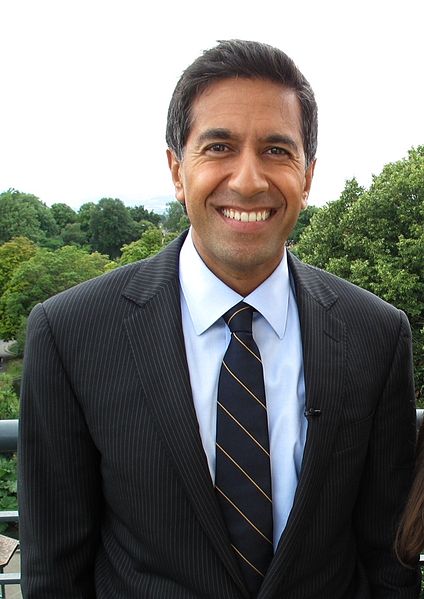
When Attorney General Eric Holder announced Monday that there were too many people in federal prison, outlined Justice Department plans to stop charging low-level and nonviolent drug offenders (ie. cannabis users) with crimes that carry mandatory minimums and announced that many elderly prisoners may be eligible for early release, my first thought was, “It’s about time.”
“The war on drugs is now 30, 40 years old. There have been a lot of unintended consequences,” Holder told NPR last week ahead of Monday’s speech.
This came at the same time as a column and hour-long CNN special that aired Aug. 11 with Dr. Sanjay Gupta, who announced that, after seriously studying the issue, he has changed his position on medical cannabis.
While doing his research for the highly recommended special, called Weed, he concluded that — gasp! — the federal government has based its cannabis policies on lies for the last 70 years. Science, he found out, has had nothing to do with it, and he apologized for being part of the misinformation campaign the government is waging.
“I mistakenly believed the Drug Enforcement Agency listed marijuana as a Schedule I substance because of sound scientific proof,” Gupta said. “Surely, they must have quality reasoning as to why marijuana is in the category of the most dangerous drugs that have ‘no accepted medicinal use and a high potential for abuse.’ They didn’t have the science to support that claim, and I now know that when it comes to marijuana neither of those things are true.”
That’s not especially earth-shaking to anyone who knew that Richard Nixon rejected the findings of his own government-funded commission on cannabis in 1972 — it recommended legalization even back then — and the federal government, law enforcement and the prison system have fallen in lock-step ever since.
But for someone as mainstream as Gupta, watched by millions of viewers around the world, to admit this on national television suggests how mainstream legislators, doctors and a lot of Americans are changing their minds about cannabis. I’m guessing he won’t be the last. Holder’s “Smart on Crime” plan tells me that the feds are at least beginning to listen, because many of these low-level prisoners are there for using “illegal” drugs.
This change in attitude is similar in many ways to how Americans have come to view gay marriage. More and more people, even some bound by long-held religious axioms, have noticed that the gay pair next door are really good neighbors, the homosexual couples and their children they meet at school are no different than their own kids, and the fabric of American society isn’t being undone by same-sex marriage.
With cannabis, non-users are beginning to question why more than 15 million Americans admit to using a product the federal government says is mortally dangerous and spends billions of dollars per year to prohibit. Regular Americans are noticing that their friends and neighbors who smoke pot have the same ups and downs as anybody else and that they aren’t strung-out, psychotic zombies. They are questioning why a drug that has never caused an overdose and is showing clinical promise isn’t being used more in medical circles.
This isn’t Revenge of the Potheads 2. Forty percent of our states — Illinois is the most recent — and the District of Columbia have legalized medical marijuana, and many others are making plans that allow for medical research into cannabis’s medical implications. Gupta uses two Colorado cases to help make part of his argument, and though the Colorado doctor who treats a young girl for seizures with marijuana extract admits that the science “isn’t there yet,” the results he sees are palpable and real.
In his speech Monday, Holder suggested that the legislative and executive branches come to an agreement on sentencing. That might sound crazy given today’s Congressional animus, but interestingly, bi-partisan support for sentencing reforms is growing in Congress.
In the executive department, Gil Kerlikowske, director of the Office of National Drug Control Policy, was recently nominated to head U.S. Customs and Border Protection. This gives President Obama a unique opportunity to nominate a “drug czar” willing to shift the emphasis of the drug war away from a criminal justice model and toward one that addresses health and racial disparity issues. That would be a big step.
There are those who would attack the current administration for our failed drug policies and failure to change them quickly enough. It’s easy to forget that it was the Obama Justice Department announcement in 2009 that opened the gateways to Colorado’s medical marijuana system and, in effect, to Amendment 64.
As the president likes to say, he’s not a king, and the problem is systemic, with law enforcement, the “private” prison industry and the DEA all having stakes in continuing present policies.
But for the president to put someone in charge of the Office of National Drug Control Policy not beholden to special government interests would send a strong message that he knows this bullshit has to end.
One change in Justice Department policy and a major TV talking head speaking out about cannabis prohibition doth not a revolution make. But Holder’s admission that it’s time for changes in a failed policy and Gupta’s realizations are just further proof that the momentum on cannabis reform is still cresting.
Send tips, suggestions and criticisms to [email protected].
Respond: [email protected].














